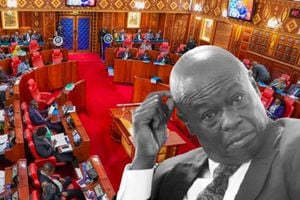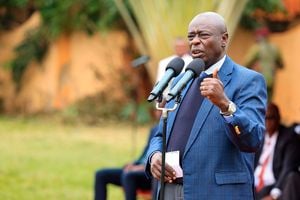Experts: Community empowerment key to climate change adaptation

Delegates following proceedings during the Earthwise Summit ‘24 at KWS Club House in Nairobi on Thursday.
What you need to know:
- The experts advocate for mechanisms that direct funding straight to grassroots levels, enabling local populations to invest in sustainable practices tailored to their specific circumstances.
As the world grapples with the escalating impacts of climate change, experts have emphasised the role of community engagement in adaptation efforts.
Speaking during the just-concluded Earthwise Summit organised by Nation Media Group, experts from diverse climate-related fields emphasised the importance of empowering local communities, embracing indigenous solutions and fostering collaboration to build a resilient future.
Mr Kennedy Ododa from the Adaptation Consortium, an initiative helping strengthen the climate finance data ecosystems at the county level, voiced a compelling message regarding grassroots involvement in resilience-building. “To truly support the resilience of communities, we must ensure that financing flows to the lowest levels. Public participation is crucial; communities must be part and parcel of the initiatives affecting their lives,” he said.
Mr Ododa highlighted that while access to finance is essential for successful adaptation, many rural communities struggle to secure the necessary capital for effective strategies.
He advocates for mechanisms that direct funding straight to these grassroots levels, enabling local populations to invest in sustainable practices tailored to their specific circumstances.
“The most vulnerable populations must be involved in decision-making processes. This isn’t just about funding; it’s about creating governance systems that are adaptive and inclusive.”
According to Mr Ododa, though public participation is crucial in this area, it should extend far beyond mere consultation. “It should involve actively engaging communities in both the design and implementation of strategies tailored to their unique needs.
“We need to ensure that climate information services are user-centric so communities can readily understand and utilise the information provided. This user-focused approach not only fosters ownership but also significantly enhances the effectiveness of adaptation initiatives,” he said.
Another essential aspect of resilience-building, he said, is the establishment of robust monitoring and evaluation frameworks. “By systematically assessing what works and what doesn’t at the community level, stakeholders can refine strategies and share valuable insights,” Mr Ododa said, stressing the importance of frameworks that facilitate learning and reflection so as to enable communities to adapt based on past experiences.
Highlighting the impact of innovative local projects in Kenya, he cited Isiolo County, where the establishment of a livestock disease laboratory is enhancing animal health and productivity—essential for the survival of pastoral communities in a changing climate.
Likewise, resilience programmes in Garbatula, based on eight locally-derived principles, showcase how indigenous solutions can effectively address climate challenges.
“We are equipping communities with tools to adapt, ensuring that decisions are devolved to the local level. This empowers them to tackle structural inequalities that often leave the most vulnerable behind,” said Mr Ododa.
While communities on land are adapting, the oceans face their own set of climate challenges. Ms Yvonne Muyia, programme coordinator at REEFolution Trust, an initiative focused on marine ecosystems, warned of the grave consequences of climate change on marine biodiversity. “Earlier this year, we lost more than 50 per cent of coral reefs due to rising sea temperatures,” she lamented.
Coral reefs are not merely beautiful underwater structures; they are biodiversity hotspots, vital coastal protectors and integral to the local economy. “Healthy reefs support fisheries and tourism, which are essential for many coastal communities,” Ms Muyia explained. “Their decline threatens not just marine life, but human livelihoods as well.”
According to Ms Muyia, the phenomenon of marine bleaching, primarily driven by elevated water temperatures, underscores the urgent need for protective measures. “The resilience of coral reefs hinges on addressing both climate change and local stressors such as pollution and overfishing.”
A theme of collaboration resonated throughout the panel discussions at the summit.
Mr Henry Gandhi, research associate at the African Conservation Centre, pointed out: “If we don’t utilise science and evidence in decision-making, we may pay the price. Everyone needs to be part of this process.”
To combat climate change effectively, he said, local adaptation initiatives must be inclusive and grounded in the realities faced by communities. “We need homegrown solutions that are participatory in nature.
“Equity is key; we cannot talk about adaptation if people don’t benefit from it.”
Discussing the impact of climate change on wildlife in Kenya, Prof Charles Musyoki, director, Wildlife and Community Service – Kenya Wildlife Service – emphasised that these effects reach far beyond human communities.
He shared some concerning observations: “Our protected wildlife areas are not immune. We are experiencing prolonged dry and wet seasons, which are resulting in significant food shortages and increased wildlife mortality.”
He highlighted a range of solutions currently being implemented, from supplementary feeding programmes in national parks to involving local communities in conservation efforts. “Public participation is crucial. When communities recognise the importance of wildlife, they see the benefits, making conservation a shared responsibility,” he remarked.
Ms Nancy Githaiga, country director – Africa Wildlife Foundation, highlighted the pressing need for sustainable conservation practices that are economically viable. “Investments in conservation must be profitable for impact investors. If we can prove that conservation benefits communities economically, we’ll see increased support.”
Ms Susan Jepkemoi, CEO at Baringo County Conservancies Association, echoed this sentiment, emphasising the significance of integrating indigenous knowledge with modern conservation techniques. “Communities have co-existed with nature for generations; their insights are invaluable,” she asserted.





